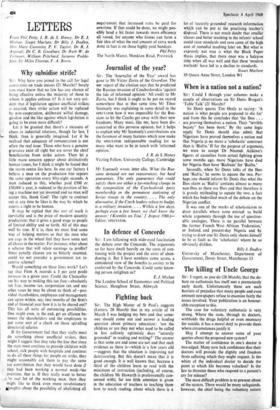Why subsidise strife?
LETTERS
From Phil Petty, J. R. de S. Honey, Dr E. J. Mishan, Stuart Maclure, Dr Billy J. Dudley, Mrs Mary Cummins, P. V. Taylor, Dr R. J. Asp/nail, Dr C. B. Goodhart, Dr Ruth W. de Tichauer, William Pritchard, Susanne Pudde- loot, Sir Miles Thomas, F. A. flown.
Sir: Why have you joined in the call for legal constraints on trade unions (21 March)? Surely- you must know that no law has any chance of being effective unless the majority of those to whom it applies enforce it? Is it not very evi- dent that if legislation against unofficial strikes• is enacted, then strike action will be replaced by non-cooperation, deliberate wilful damage, go-slow and the like against which legislation is going to be even more difficult?
Let it be granted that there's a measure of chaos in industrial relations, though far less, I think, than is generally imagined. Let it be realised that adequacy of remuneration is not often the real issue. Those who have a genuine grievance exist all right but are never the chief beneficiaries from strike action. Then let a little more concern appear about distinctively human issues, for I think it might be found that the storm centre lies here. In one car factory I believe a man on the production line repeats the same operation every fifty-eight seconds. A man reduced to this, whether paid £500 or £50,000 a year, is reduced to the position of be-. ing a machine not yet invented and no man will accept this, thank God! The right to contract out at any time he likes is the way by which he asserts a right to be human.
It may be replied that this sort of work is inevitable and is the price of modern quantity production; that it gives a good wage to people of limited ability and so forth. All of this may well be true. If it is, then we must find some way of helping matters so that the men who are cogs in the wheel feel they have some sort of choice in the matter. For instance, what about a scheme that will relate earnings to profits? Since penalty clauses are so bitterly resented, could we not consider a government tax in- centive scheme?
Would something on these lines work? Let's say that Firm A records a 5 per cent profit increase in a given year. Could the Chancellor see his way to making this tax free—absolutely tax free, income tax, corporation tax and any other taxes he may be about to think of—pro- vided shareholders, employees and management can agree within, say, two months of the firm's end of financial year how it is to be shared out? This has all sorts of entrancing possibilities. One might even, in the end, get an alliance be- tween the shareholders and the employees to put some sort of a check on those spiralling directorial salaries
If the Government feel that they really must do something about unofficial strikes, then might I suggest that they take the line that since the state must continue to provide children with school, sick people with hospitals and continue to do all these things for people on strike, they might reasonably ask them to pay the same tax contribution that they would have done if
they had been working a normal week--ino overtime, that is. If they really want to better se real lot of the working man, then they might like to think even more revolutionary aitoughts about the possibility of abolishing all
requirement that increased rates be paid for overtime. If that could be done, we might pos- sibly head a bit faster towards more efficiency all round, for anyone who listens can form a fair idea of what the real amount of extra work done in fact is on those highly paid Sundays.


































 Previous page
Previous page